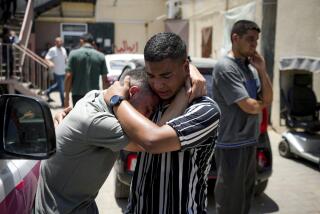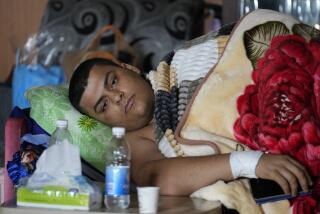32 Killed in Baghdad Blasts
- Share via
BAGHDAD — A multi-pronged attack Thursday on one of the city’s most well-heeled quarters killed at least 32 Iraqi civilians and left scores of screaming and bloodied wounded, most of them middle-class Shiite Muslims shopping in one of the capital’s few still-vibrant commercial districts.
At least five blasts struck the Karada area of central Baghdad, including a devastating car bomb along a crowded strip of butcher shops that set buildings ablaze.
Iraqi police armed with AK-47s and handguns fired into the air, quickly sealing off the area, which is surrounded by numerous layers of checkpoints.
Footage taken immediately after the car bombing and broadcast on state-owned Al Iraqiya television showed a weeping woman, her face bloodied, being led from the scene. Two men struggled to carry a limp elderly man in a traditional Arab robe over a pile of debris from crushed buildings. Survivors begged police to help friends and relatives trapped in an inferno.
“I headed back to my shop to see it blazing with fire and my friends and neighbors killed or wounded,” said Zuhair Ali Hussein Zaidi, 30, a hardware store owner. He had left to investigate one blast, only to return and find his shop completely destroyed.
“I saw children completely burnt and many injured,” he recalled. “People were evacuating the dead and injured.”
The explosions turned several buildings into mangled heaps of twisted steel girders, rubble and dust. Bloodied residents scrambled around the close-knit neighborhood looking for loved ones, including an 11-year-old girl on a shopping errand who remained missing. It was eight hours after the blast before six of the dead were discovered beneath piles of rubble.
The 10 a.m. attack bore the signature of Sunni Arab insurgents possibly allied with foreign extremists, such as Al Qaeda in Iraq. Police said the four of the blasts were caused by rockets or mortar rounds. But officials often have attributed such explosions to indirect fire, hoping to avoid blame for allowing insurgents in explosives-packed vehicles to slip past the checkpoints that dot the city.
Overlapping layers of insurgent, sectarian, ethnic, tribal and criminal violence have overwhelmed Iraqi civilians, many of whom stay cloistered in their homes and immediate neighborhoods out of fear for their lives.
“There are many collaborators involved in the violence,” said Saif Daik, 23, a grocery store employee near one of the blast sites. “The Americans, the foreign fighters, the political parties, the criminals and the terrorists, all are part of it.”
At least 15 people were killed in four coordinated car bombs that struck the neighborhood in June 2005. Thursday’s attacks came amid talk of increasing the number of U.S. troops in Baghdad to supplement a six-week security crackdown that has failed to slow violence in the capital.
Army Lt. Gen. Peter W. Chiarelli, the U.S. military’s commander of day-to-day operations in Iraq, told The Times on Wednesday that he wanted to use American soldiers to oversee infrastructure projects.
Areas such as Karada form the backbone of Prime Minister Nouri Maliki’s political support. In a statement Thursday, Maliki, who was on a visit to the U.S., blamed the attacks on religious extremists and loyalists of Saddam Hussein, condemning them as “new evidence of their defeat, bankruptcy and rancor toward anything Iraqi.”
Violence has escalated in Iraq this year despite numerous plans to improve security, the slaying of insurgent leader Abu Musab Zarqawi and the formation of a full-term government.
The bodies of at least 19 men were discovered Thursday in various parts of Baghdad. They had been shot in the head and bore signs of torture.
Armed men in Iraqi army uniforms and vehicles stole $1.35 million in Iraqi dinars from vehicles transporting cash from the central bank to a private bank in west Baghdad, police said. Last week, gunmen seized nearly $1 million in another west Baghdad bank robbery.
Gunmen killed three men working for a foreign security company in the western Baghdad neighborhood of Mansour, also the site of clashes Thursday between suspected insurgents and police. In addition, five traffic police officers were reported kidnapped in east Baghdad.
Two American military personnel “suffered minor wounds” Wednesday during a joint “counter-death squad operation” that netted five suspects and “bomb-making materials,” a news release said.
In violence outside the capital on Thursday, gunmen opened fire on a checkpoint run by Georgian soldiers near Baqubah, wounding several, police and witnesses said. U.S. support vehicles evacuated the soldiers to a nearby airbase. Two bomb blasts in and around Baqubah, a religiously mixed city northeast of Baghdad, left at least four dead and nine injured.
Two Iraqi police officers, a soldier and a civilian were reported killed in separate shooting incidents in and around the northern city of Kirkuk.
Also Thursday, defense arguments concluded in the first trial examining the alleged crimes of Hussein’s regime, with court-appointed lawyers for former Baath Party militia leader Taha Yassin Ramadan and former Judge Awad Hamed Bandar making lengthy presentations.
Bandar lashed out at the court, asking to leave.
“Be quiet!” Judge Raouf Rasheed Abdel Rahman ordered. “Sit down or [the guards] will make you sit down!”
“I refuse this lawyer!” Bandar shouted.
“Be quiet and sit down, stupid!” the judge responded.
The trial, in which Hussein and seven codefendants face murder charges in the killings of 148 Shiite villagers from Dujayl, will resume Oct. 16, when a verdict is to be issued. Hussein faces another trial next month, on genocide charges in the killings of thousands of Iraqi Kurds in the Anfal campaign in 1988.
*
Times staff writer Shamil Aziz and special correspondents in Baghdad, Baqubah and Kirkuk contributed to this report.
More to Read
Sign up for Essential California
The most important California stories and recommendations in your inbox every morning.
You may occasionally receive promotional content from the Los Angeles Times.













